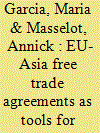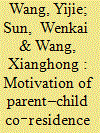| Srl | Item |
| 1 |
ID:
144983


|
|
|
|
|
| Summary/Abstract |
Article 21 of the Treaty of Lisbon mandates the European Union (EU) to foster its values (democracy, the rule of law, social rights, gender equality, etc.) in its external relations. The core concern of the EU’s multi-faceted relations with Asia is economic relations with rising markets. EU relations with the region have focused on the facilitation of trade and investment through the negotiation of free trade agreements (FTAs) with a number of Asian partners. EU FTAs are accompanied by a Political Cooperation Agreement (PCA), which links core EU values to trade through the ‘standard clause’, whereby under certain circumstances, human rights’ abuses can trigger a suspension of trade preferences. Using a qualitative case study methodology, and drawing on policy documents and interviews, this paper addresses the question of whether, and how, the EU can balance its internal legal obligations with its economic interests and its partners’ demands. The article provides a legal background of the EU’s obligations in terms of international value promotion. It then reviews EU trade policy strategies and reveals an absence of a concerted approach to the inclusion of values. The article investigates the sources of resistance to EU attempts at linking its trade policy with broader values including social rights with Asian partners. The analysis reveals that Asian resistance is centred on the legalistic approach of the EU rather than the values and suggests that a more effective norm export might be achieved through other means. The article concludes that the EU’s failure to push forward social issues in FTAs ultimately casts serious doubts about the EU’s international ‘actorness’ in the area of social rights.
|
|
|
|
|
|
|
|
|
|
|
|
|
|
|
|
| 2 |
ID:
164727


|
|
|
|
|
| Summary/Abstract |
This paper examines the motivations of parent‐child co‐residence behavior in China using data from the China Health and Retirement Longitudinal Study. We test three possible motives: social norms, self‐interest and altruism. We find that social norms play an important role in household co‐residence behavior, showing that the belief that “sons take care of parents” is strong, and children in different birth orders take different responsibilities. Taking the one‐child policy as a natural experiment, we compared co‐residence behavior between only‐child and multi‐child families. This allowed us to test whether children in multi‐child families with wealthier parents more often co‐reside in order to compete for a bequest. We find that parents' wealth is more appealing to children in multi‐child families. The results support the life cycle theory that co‐residence decisions are motivated by self‐interest. We also find some evidence of altruism when parents and children make co‐residence decisions. These findings provide some insights for designing future elder‐support policies in China.
|
|
|
|
|
|
|
|
|
|
|
|
|
|
|
|